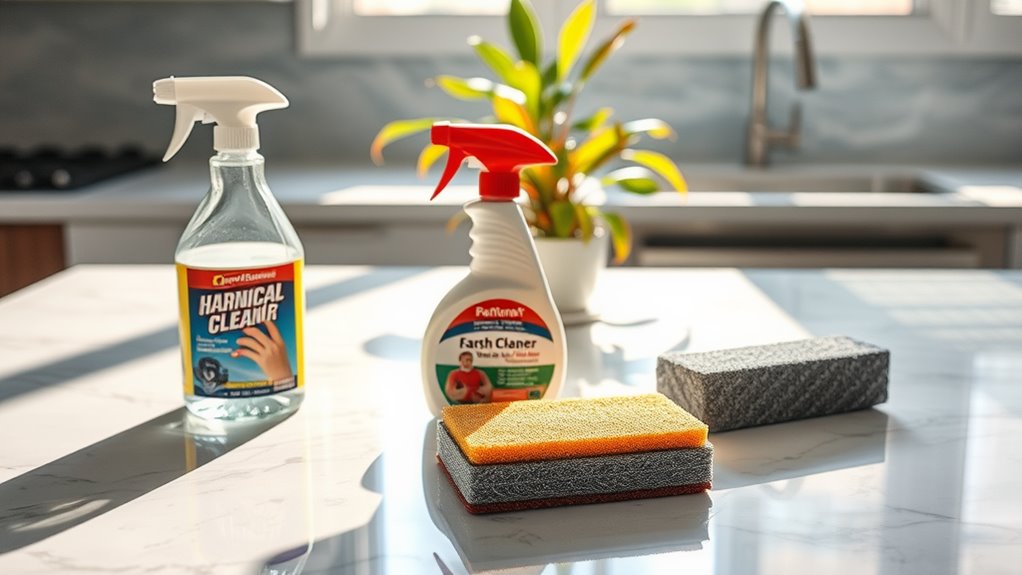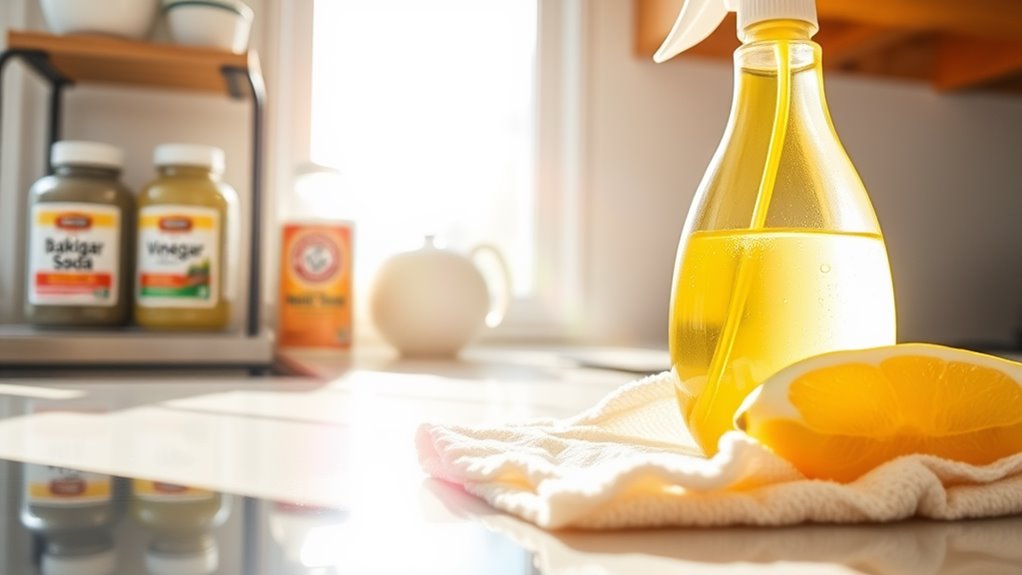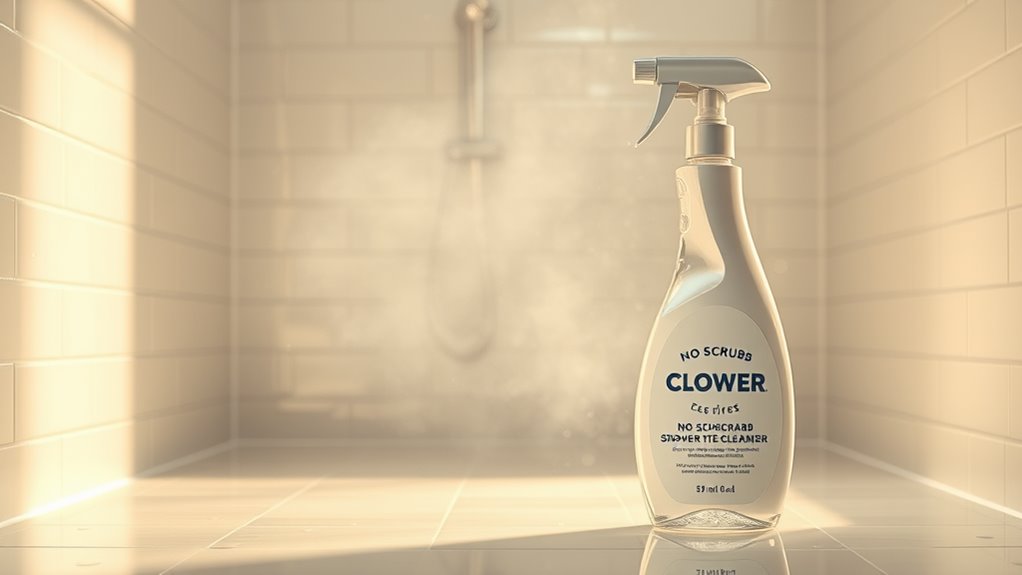Stop Using These 3 Products-They’re Ruining Your Surfaces
Stop using bleach, abrasive cleaners, and vinegar! Bleach can weaken surfaces and create toxic fumes when mixed with ammonia. Abrasive cleaners scratch and dull your surfaces over time, making them harder to maintain. Vinegar might seem harmless, but its acidity can erode finishes on wood and stone. These products damage your investments and compromise your health. There are safer, eco-friendly alternatives that can keep your home clean and beautiful, so stick around to discover them!
Key Takeaways
- Overuse of bleach can damage wood and fabric surfaces, compromising their integrity over time.
- Abrasive cleaners contain gritty particles that scratch and dull surfaces, leading to long-term damage.
- Vinegar’s acidity can erode finishes on natural stone and strip protective coatings from wood.
- Mixing bleach with ammonia releases toxic gases, posing serious health risks.
- Opt for eco-friendly cleaners and natural disinfectants to preserve surfaces and protect your health.
Bleach: The Surface Destroyer
While bleach may seem like a go-to solution for cleaning and disinfecting, it actually poses significant risks to both your surfaces and your health. Many people make cleaning mistakes by over-relying on bleach, thinking it’s the ultimate disinfectant.
Instead, it can damage various materials, such as wood and fabrics, leading to irreversible harm. Using bleach on surfaces like countertops can weaken their integrity and create long-term issues. Moreover, many natural disinfectants can effectively kill germs without risking damage to your surfaces. For instance, using simple techniques like vinegar and baking soda can help maintain cleanliness without the harmful effects of bleach. Additionally, creating an eco-friendly all-purpose cleaner can help you safely clean and shine a variety of surfaces in your kitchen without harsh chemicals. Regularly using steam cleaning can also sanitize surfaces while preserving their quality.
Furthermore, mixing bleach with other cleaners, like ammonia, can produce toxic gases that endanger your health. To achieve mastery in cleaning, consider safer alternatives that don’t compromise your surfaces or well-being. Switching to safer alternatives can help protect your home investments and ensure a healthier living environment.
Abrasive Cleaners: Scratching the Surface
Abrasive cleaners can be tempting for tackling tough stains, but they often do more harm than good.
While they may promise a quick fix, their gritty particles can scratch and dull surfaces, leading to long-term damage. You might think you’re achieving a pristine finish, but those micro-scratches accumulate, making surfaces harder to clean and more prone to staining. Additionally, using eco-friendly alternatives can help maintain the shine of your surfaces without the risk of scratching. Natural disinfectants like vinegar and essential oils can effectively kill germs without damaging your countertops. By using natural ingredients for cleaning, you not only protect your surfaces but also contribute to a healthier environment. Deep cleaning with natural, non-toxic ingredients ensures that your bathroom remains fresh and safe for your family.
Instead of using these harsh products, consider gentler alternatives that effectively lift grime without compromising your surfaces. Remember that commercial cleaning products can cause significant damage to countertop surfaces over time.
When you master the art of cleaning with purpose, you’ll preserve the integrity of your surfaces while achieving the results you desire.
Say goodbye to abrasive cleaners and hello to a more sustainable, surface-friendly cleaning routine. Your surfaces will thank you for it!
Vinegar: The Hidden Risk
Though vinegar is often hailed as a natural cleaning agent, it carries hidden risks that can damage certain surfaces.
If you’re aiming for mastery in home care, be cautious about using vinegar on the following:
- Natural Stone: The acidity in vinegar can erode the finish, leading to dull surfaces and permanent damage. Additionally, using eco-friendly alternatives can ensure that you maintain the beauty of your natural stone. Regular maintenance with natural ingredients can also help preserve its luster.
- Wood: Vinegar can strip the protective finish off wood, causing warping and discoloration over time.
- Electronics: Spraying vinegar directly on electronics can lead to corrosion and malfunction.
While vinegar may seem like a quick fix, it’s crucial to take into account the potential harm it can inflict on your valuable surfaces. Additionally, combining vinegar with baking soda may produce mostly water and diminish its cleaning effectiveness.
Opt for safer alternatives tailored to specific materials to promote longevity and aesthetics.
Frequently Asked Questions
What Are Safer Alternatives to Bleach for Disinfecting Surfaces?
If you’re looking for safer disinfecting alternatives, try vinegar, hydrogen peroxide, or essential oil blends. They effectively kill germs without harsh chemicals, ensuring your surfaces stay clean while promoting a healthier environment for you and your family.
How Can I Remove Tough Stains Without Abrasive Cleaners?
To remove tough stains, try using a mixture of vinegar and baking soda. Apply it directly, let it sit, then scrub gently. You’ll notice how effective this method is without damaging your surfaces.
Is Vinegar Safe for All Types of Surfaces?
Vinegar’s versatile, but it isn’t safe for all surfaces. Avoid using it on natural stone, wood, or waxed finishes, as it can cause damage. Always test a small area first to guarantee it’s safe.
Can These Products Harm My Health or the Environment?
Yes, some cleaning products can harm your health and the environment. They may release harmful chemicals, cause respiratory issues, or contribute to pollution. Always check labels and choose safer alternatives to protect yourself and the planet.
What Cleaning Products Should I Avoid for Wood Surfaces?
When maintaining wood surfaces, avoid harsh chemicals like bleach, ammonia, and vinegar. These can damage the finish and wood itself. Instead, opt for gentle, pH-balanced cleaners specifically designed for wood to preserve its beauty.



